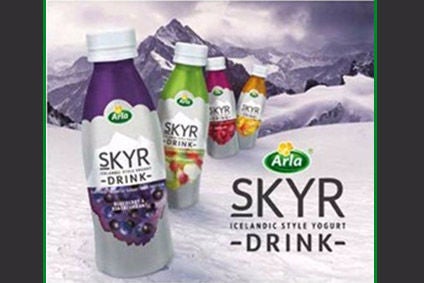
Danish dairy giant Arla Foods has said it is planning to make record levels of investment this year.
The cooperative announced the move today (19 February) after revealing sales stagnated in 2019 at EUR10.5bn (US$11.3bn) – marginally up on the EUR10.4bn recorded in 2018.

Discover B2B Marketing That Performs
Combine business intelligence and editorial excellence to reach engaged professionals across 36 leading media platforms.
Arla said the growth it did achieve was mainly due to progress in its global brand portfolio which saw a 5.1% increase in sales compared to the previous year.
The Lurpak butter and Castello cheese brands owner said it is planning to pump money back into the business this year.
It said: “2020 will again be characterised by large investments. Arla plans record investments of EUR619m.
“These should flow into important projects for capacity expansion in growth sectors such as milk powder for international markets – including the further construction of the tower for milk powder production in Pronsfeld (Germany), capacity expansion for mozzarella production in Branderup (Denmark), and expansion for the newly acquired production site in Bahrain, as well as in significant investments to increase capacity in Arla Foods Ingredient’s business.”

US Tariffs are shifting - will you react or anticipate?
Don’t let policy changes catch you off guard. Stay proactive with real-time data and expert analysis.
By GlobalDataPeder Tuborgh, CEO of Arla Foods, said: “In the course of 2019, we expanded the positive dynamics in our business. Arla is now in a stronger position than a year ago. We have strengthened our competitiveness, exceeded our financial targets and at the same time continued our transformation with the Calcium programme.”
Arla revealed it plans to target Germany from an investment perspective.
It plans to strengthen its organic brands in the German market and launch new products in the yogurt segment. It said that in 2020 there will also be a strong focus on Arla Skyr in Germany with the “most extensive investments” since the brand was founded.
Markus Mühleisen, Arla’s CEO in Germany, said: “This year we want to continue our brand growth in order to further increase the value added for the milk of our cooperative members. This is the only way we can pay an adequate milk allowance in the long term, with which farmers can set up their farms in a sustainable and future-proof manner.
“We also work with our retail customers on innovative products with higher added value. We are particularly focusing on the new pilot plant in our plant in Upahl, which we started up last fall.”
Arla, owned by some 10,000 farmers in Denmark, Sweden, Germany, the UK, Luxembourg, the Netherlands and Belgium, recorded an operating profit of EUR406m in 2019, compared to EUR404m in the previous year.
The company said it expects revenue this year of between EUR10.4bn and EUR10.8bn.





